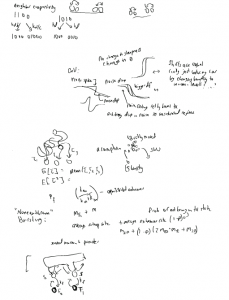10:00 A – 9:00 P
Shadow enhancer modeling
- worked out algorithm using binary codebook to compute the random order binding matrices for arbitrary number of binding sites.
- upgrading laptop to Ubuntu 13.04
- Monet froze during scheduled (requested) windows reboot/install updates. Probably a bad thing.
- Computing probabilities.
- Error in PLoS CB paper (missing lambda in front of eq (1)).
- Observation: the finite time state switching is the primary source of noise. Steady state just doesn’t give differences on this scale.
Computing probabilities
Questions
Can one compute first passage times starting from mixed states (e.g. starting at stationary distribution)?
If the Laplace transform of my process is:
Phi = lambdainv(lambdaeye(N) – Mtilde)_(s,f)
Previously we did things like s=1 and f = N (the last state), so Phi_(s,f) was just a single entry in the matrix Phi. Can one compute first passage times starting from mixed states? If so, does this correspond to something simple like a weighted sum of the Phi_(s,N): phi(lambda) = p(1)Phi_(1,N) + p(2)Phi_(2,N) + …
and still compute moments with derivatives of phi?
Yes this is true
Can I count the number of visits to any one of several states (rather than visits to a particular state). I’m happy to do this starting the whole system from its stationary distribution. I’d still like to get the average number of visits in a time window T to any of my special states and the variation in the number of visits in T?
With only one special state (i.e. one transcriptionally competent state) we previously calculated the average number of visitations as T/m1_tau, where m1_tau is the average first passage time from equilibrium to the special state.
The variance in the number of visitations goes like
sigma2_tau/(m1_tau*T)
So for the multiple special states, the mean is probably just the sum of the mean visitation rates to each individual special state? Can I sum second moments of the visitation rate too?
project 2
- BLAST primer list
- all 20mers have hits.
- Let’s BLAST against exons only — single spots in the nucleus to doublestranded DNA aren’t going to bother us if they even stick in our hybe conditions.
- teritary has hits of length 18 to exons
- primary-adapter (32bp) and secondary (64 bp) have max hits of 15, and PPT has max hits of 14.
- see
S130426_BLASTprimers.minProjects\Genomics\Code\Scripts

